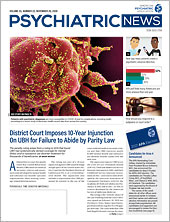A federal district court this month ruled that United Behavioral Health (UBH) must use medical necessity criteria and assessment tools developed by mental health and substance use disorder specialty organizations when making coverage-related determinations.
The ruling was part of a 10-year injunction against UBH issued by Judge Joseph Spero of the United States District Court for the Northern District of California in Wit, et. al. v. United Behavioral Health. The injunction also includes a requirement that UBH personnel be trained in the use of the court-ordered medical necessity criteria and that UBH reprocess nearly 67,000 mental health and substance use disorder benefit claims over the next year.
The injunction requires UBH to use the Level of Care Utilization System (LOCUS), Child and Adolescent Service Intensity Instrument (CASII), and Early Childhood Service Intensity Instrument (ECSII)—assessment tools developed by the American Association of Community Psychiatry (LOCUS) and the Academy of Child and Adolescent Psychiatry (CASII and ECSII)—as well as criteria developed by the American Society of Addiction Medicine.
The ruling is the “remedy” phase of the case resulting from the court’s decision signed on February 28, 2019 (see
Psychiatric News). The court held that UBH had illegally denied coverage for mental and substance use disorders based on flawed medical necessity criteria. Those denials impacted more than 50,000 UBH enrollees and involved 67,000 claims for coverage across four states: Connecticut, Illinois, Rhode Island, and Texas.
The ruling was the first time a major insurer was found to be relying on improper guidelines as a basis for denying health care services. In its February decision, the court found “[m]any mental health and substance use disorders are long term and chronic. While current symptoms are typically related to a patient’s chronic condition, it is generally accepted in the behavioral health community that effective treatment of individuals with mental health or substance use disorders is not limited to the alleviation of the current symptoms. Rather, effective treatment requires treatment of the chronic underlying condition as well.”
Responding to the ruling, APA President Jeffrey Geller, M.D., M.P.H., said, “We applaud Judge Spero for holding this major insurer accountable for discriminating against patients with mental illness by denying them the care they need and are entitled to by law.”
The injunction will be in effect for 10 years and will be reviewed by the court after five years, with the burden resting on UBH to prove whether the injunction is no longer needed at that time. UBH must train its personnel on how to make coverage decisions consistent with the insurer’s obligations, including during the reprocessing of the claims at issue in the case. The court appointed a special master to oversee the claims reprocessing, finding the appointment was justified on the basis that “UBH abused its discretion in administering the class members’ plans, placing its financial interests before its duties to plan members, and depriving members of their right to determinations of coverage that were consistent with their plans. UBH misled regulators. Many of the high level UBH executives who testified at trial were evasive and offered testimony that was not credible. And UBH has opposed virtually every form of relief Plaintiffs requested. Under these circumstances, oversight of the reprocessing remedy and prospective injunctive relief is necessary to ensure that UBH complies with the court’s remedies order.”
UBH will have the opportunity to appeal the decision to the United States Court of Appeals for the Ninth Circuit after a final judgment is entered.
This ruling is expected to have significant implications for the way mental health services are handled by plans. Geller, in his statement following the ruling, said that APA will continue to be vigilant whenever insurers fail in their duty to abide by laws requiring parity between coverage of general medical care and coverage for mental illness and substance abuse disorders.
“We hope insurers will take note of this ruling and stop the discriminatory practice of denying or limiting coverage of treatment for mental illness and substance use disorders,” he said. ■
